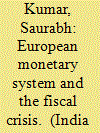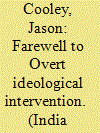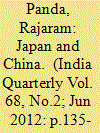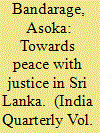| Srl | Item |
| 1 |
ID:
114066


|
|
|
|
|
| Publication |
2012.
|
| Summary/Abstract |
The episode of fiscal crisis in the Euro zone has now become a recurrent theme of debate and has attracted a range of experiences regarding the nature of fiscal turmoil, its causes and effects, which vary widely across individual countries. The confidence in the European monetary system has been confounded with the European fiscal turmoil. The phases of its revival and by what method it will recoil, and at what velocity, are unanswered questions. At the centre of the European monetary system is the European Central Bank (ECB) which shapes and conducts a vigorous and complex set of policies and institutional arrangements that represent the image of neoliberal economic ideology. The debate over the European monetary system's architecture has significant ideological, economic and political implications. This article approaches the debate by assessing the monetary policy strategy and in particular the organisational structure of the ECB, and what role they play in the conduct of economic and monetary course of action in the Euro zone.
|
|
|
|
|
|
|
|
|
|
|
|
|
|
|
|
| 2 |
ID:
114067


|
|
|
|
|
| Publication |
2012.
|
| Summary/Abstract |
At times, the leaders of nations send numerous troops abroad so that governments can be created or preserved. Some of these operations are completed without much trouble, but it is important to emphasise how many turn out to be quite arduous. Most officials elect to abandon these difficult missions. This tendency was actually on display in the 1980s. At the beginning of this decade, the leaders of Iran elected to invade Iraq. As this operation commenced, Iranian officials were quite confident that another Islamic theocracy could be established inside this Middle Eastern nation. However, once multiple setbacks were experienced, this confidence began to dissipate and the initiative was brought to an end. Since the conclusion of the 1980s, only a small number of nations have made the same transition as Iran. In this article, it will be argued that the US recently became a member of this select group.
|
|
|
|
|
|
|
|
|
|
|
|
|
|
|
|
| 3 |
ID:
114062


|
|
|
|
|
| Publication |
2012.
|
| Summary/Abstract |
What is the efficacy of treaties if one of the signatories has reservations? Nepal, a signatory in the Bilateral Treaty on Peace and Friendship with India, has been raising objections on the Treaty at formal and informal levels. The signatories have agreed to review the Treaty but not much progress has been made on this. Is it because not much thought has gone in the cost-benefit analysis if the Treaty is revised and also no work has been done on the alternatives. To understand the nuances of the discourse on the Treaty, it becomes imperative to understand the discourse on the Treaty amongst the political actors, policy experts, academia in Nepal and the responses of India. What are the issues of divergence and convergence between them? How do they view their own national interests and relations, and how would it impact on the bilateral relations in case the Treaty is revised?
|
|
|
|
|
|
|
|
|
|
|
|
|
|
|
|
| 4 |
ID:
114065


|
|
|
|
|
| Publication |
2012.
|
| Summary/Abstract |
Sino-Japanese relationship is too complex a narrative in the study of security and strategic dynamics of East Asia. Despite historical irritants both have developed such a close economic relationship that neither can afford to derail the partnership by any act of miscalculation. Though neither perceives the relationship in zero-sum-game terms, both realize the benefits that would accrue if it is deepened, nothwithstanding the element of fragility in the relationship. More recently, China's military modernisation and rising assertiveness in territorial issues have raised anxiety in Japan. Similarly, China does not see kindly to Japan's Defense Guidelines that mentions China as a matter of 'concern'. The contending claims over the Senkaku Islands are a sore point in the relationship and a solution does not seem to be in the horizon. This article attempts to analyse the intricacies in the bilateral relationship in the context of changing security dynamics in the Asia Pacific region and in the wake of economic interdependence and the desire to foster economic integration of economies. China is a big challenge for Japan. Managing China through regional institutions such as East Asia summit and ADMM Plus are the desirable options. The extended presence of the US as a stabilising force is likely to stay despite talks of US 'decline'.
|
|
|
|
|
|
|
|
|
|
|
|
|
|
|
|
| 5 |
ID:
114061


|
|
|
|
|
| Publication |
2012.
|
| Summary/Abstract |
Since the end of the armed conflict and the defeat of terrorism in May 2009, the international movement to establish Tamil political autonomy in Sri Lanka's Northern and Eastern regions has intensified. The faction of the Sri Lankan Tamil Diaspora which leads the separatist struggle has declared a virtual 'Transnational Government of Tamil Eelam'. Tamil politicians on the island, the 'international community' and India are all calling for maximum political devolution along the lines of the 13th Amendment to the Sri Lankan Constitution introduced following Indian intervention in 1987. This article juxtaposes the growing demands for secessionism and devolution with demographic and ground realities in Sri Lanka and the need for policies that are responsive to the needs and interests of all communities on the island. The article considers calls for a national referendum on devolution, the district as the unit of devolution and changes needed beyond devolution at the local, regional and international levels.
|
|
|
|
|
|
|
|
|
|
|
|
|
|
|
|
| 6 |
ID:
114069


|
|
|
|
|
| Publication |
2012.
|
| Summary/Abstract |
This article discusses the role of the UN in global governance. In the absence of a world government to determine codes of conduct and regulate relations between states, multilateral approaches are needed to solve global problems. The UN provides an institutional framework for policy formulation and decision making at the international level. However, policies need to be underpinned by ideas and norms and the intellectual history of the UN suggests that the organisation is the source of many ideas that have led to human progress. For example, the concept of human rights and ideas about social and economic development and environmental sustainability have guided the UN's work in different countries. But there are gaps in global governance including normative, policy, institutional and compliance gaps that together with a deficiency of resources could undermine the global effort to implement the UN's ideas for creating a more peaceful and just world.
|
|
|
|
|
|
|
|
|
|
|
|
|
|
|
|